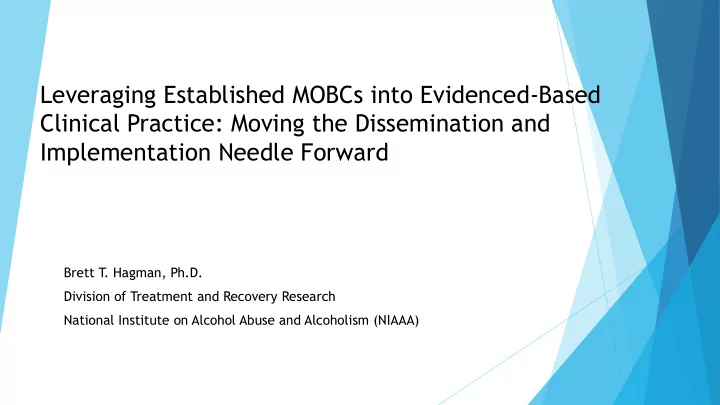

Leveraging Established MOBCs into Evidenced-Based Clinical Practice: Moving the Dissemination and Implementation Needle Forward Brett T . Hagman, Ph.D. Division of Treatment and Recovery Research National Institute on Alcohol Abuse and Alcoholism (NIAAA)
MOBC grant portfolio accomplishments: Current focus more on applying research methodology I. Application of Kazdin and Nock criteria to assist in elevating a treatment mediator into a mechanism – moving beyond Baron and Kenny II. Implement specific types of experimental designs (e.g., dismantling studies) to evaluate MOBCs III. Utilize advanced person-centered analytic techniques such as dynamic-systems modeling and person-centered approaches to evaluate MOBC IV. Adopted the use of ecological momentary assessment (EMA) and other intensive repeated-measures data collection assessment techniques V. Leveraging of translational research methods that examine MOBCs at multiple levels of analysis
Many Important MOBC Issues Require Consideration Lots of questions about what the direct public health impact actually is for the portfolio – we can not just study mechanisms Still difficult to ascertain how to leverage treatment related mediators into mechanisms Focus has been more on initiation of individual behavior change – less focus on maintenance of behavior change and macro level change Do we still focus on treatment specific mechanisms or move towards a common factors model of treatment related change? MOBC field needs a framework for merging MOBC with Dissemination and Implementation Science – no ecological framework developed for program planning and implementation Growing need to leverage research that translates MOBC science directly into clinical practice and training efforts
Why is it important to translate MOBC evidence into clinical practice? An established MOBC is part of a causal process and directly influences behavior change – we have empirically supported MOBCs to translate We have a number of empirically-supported treatments that provide “process” information that can also be translated Front line clinicians do not always have time to read and understand all of the scientific literature – busy with caseloads and seeing patients Substance abuse professionals are open to learning new treatment methods and agree research findings should be used in practice (Forman et al., 2001) Clinicians are more favorable to guidelines based on principles and procedures rather than session-by-session focus of a treatment manual - openness to understanding what works in and across treatments (Godley et al., 2001)
OBSSR at NIH Encourages Research on Adopting Research Findings into Practice The National Institutes of Health’s Office of Behavioral and Social Sciences Research (OBSSR) recently released its Strategic Plan for 2017 to 2021: (1) Improve the synergy of basic and applied behavioral and social sciences research (2) Enhance and promote the research infrastructure, methods, and measures needed to support a more cumulative and integrated approach to behavioral and social sciences research (3) Facilitate the adoption of behavioral and social sciences research findings in health research and in practice
The 17-year Odyssey: From Bench to Bedside
Building evidence for how behavioral treatments work is our main priority: Move research along the translational chain
There are many public health dissemination models that we may use or modify!
Translating MOBC science requires an understanding of how knowledge is transferred: Our field needs our own models!
Intersecting Clinical Practice and MOBC science: Need to Understand Diffusion of Innovation
Time to move beyond a focus on individual change towards a social-ecological MOBC approach!
Time to start the conversation! PRESENTATION 1: SOME KEY TERMS TO START THE CONVERSATION ON DISSEMINATION AND IMPLEMENTATION RESEARCH AND ON MECHANISMS OF BEHAVIOR CHANGE. MOLLY MAGILL, PH.D. PRESENTATION 2: MECHANISMS OF BEHAVIOR CHANGE (MOBC) AND ALCOHOL USE TREATMENT: READY FOR DISSEMINATION AND IMPLEMENTATION? STEPHEN A. MAISTO, PH.D. and DEZARIE MOSKAL, B.A. PRESENTATIONS 3 and 4: IMPLEMENTING MECHANISMS OF CHANGE IN THE REAL-WORLD: TWO EXAMPLES USING DIGITAL TECHNOLOGIES. DAVID ATKINS, PH.D. AND KEVIN A. HALLGREN, Ph.D.
Thank You Very Much! Contact Information: Brett T . Hagman, Ph.D. Division of Treatment and Recovery Research (DTRR) National Institute on Alcohol Abuse and Alcoholism (NIAAA) Email: brett.hagman@nih.gov
Recommend
More recommend